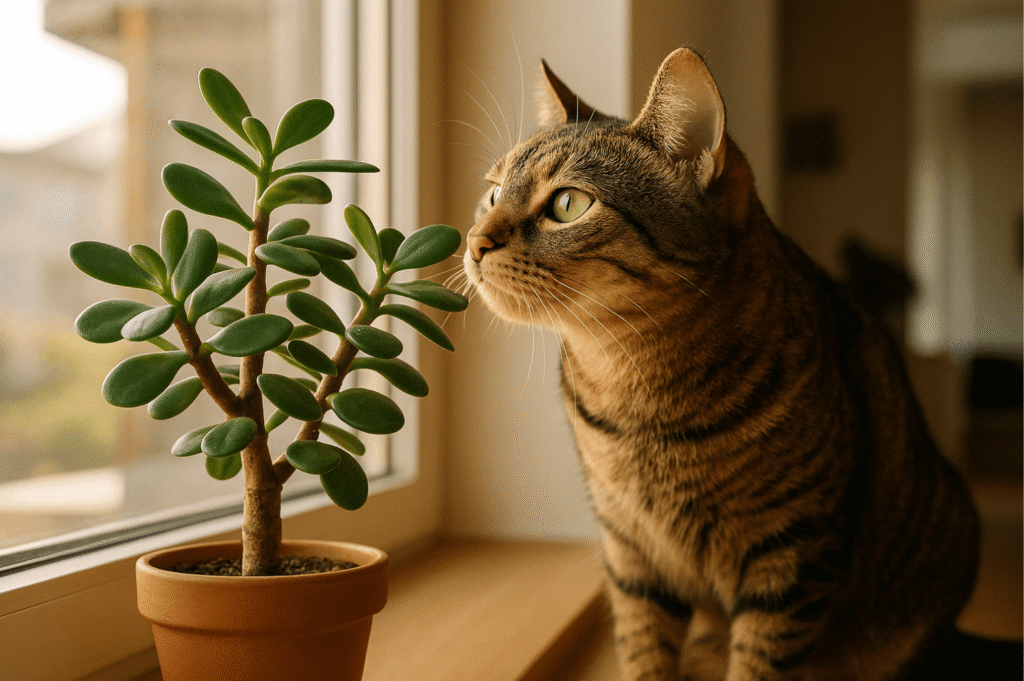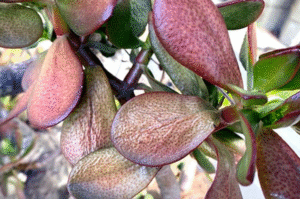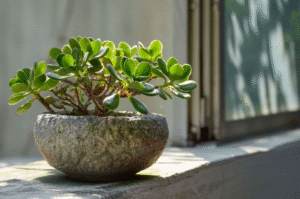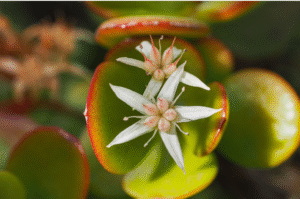Jade plants (Crassula ovata), also called “money plants” or “lucky plants,” are beloved houseplants because they’re easy to care for and bring a touch of greenery indoors. But if you’re a cat parent, you might be wondering: Is the jade plant toxic to cats?
Let’s dive deep into the answer and cover everything you need to know to keep your feline friends safe while enjoying this beautiful succulent.
Quick Answer: Yes, Jade Plants Are Toxic to Cats
According to the ASPCA (American Society for the Prevention of Cruelty to Animals) and other veterinary sources, jade plants are considered toxic to cats. Even a small bite from a jade plant leaf can cause discomfort or illness.
While not usually fatal, the symptoms can be serious enough to need medical attention.
What Makes the Jade Plant Toxic?
Jade plants contain saponins, which are natural compounds found in some plants that act as a defense mechanism against insects and animals. In cats, these compounds can irritate the digestive system, leading to vomiting, lethargy, and loss of coordination.
Though scientists don’t fully understand the specific toxin in jade plants that causes the reaction, multiple case reports have confirmed the plant’s harmful effects on felines.
Common Symptoms if a Cat Eats a Jade Plant
If your cat has chewed on or swallowed any part of a jade plant, watch out for these common symptoms:
- Vomiting
- Diarrhea
- Loss of appetite
- Lethargy or weakness
- Depression-like behavior
- Loss of coordination or staggering
These symptoms can appear within hours after ingestion. In most cases, they are mild to moderate, but every cat reacts differently. Some may have stronger symptoms based on their age, size, or sensitivity.
What to Do If Your Cat Eats a Jade Plant
1. Stay Calm
Panicking won’t help. Most cases are not fatal if treated quickly.
2. Remove Access
Take the plant out of your cat’s reach immediately. If your cat still has plant matter in its mouth, gently wipe it out with a wet cloth.
3. Call Your Vet
Even if your cat seems fine, it’s always safest to consult your vet. Tell them:
- How much your cat ate (if known)
- When it happened
- What symptoms you’re seeing
4. Watch for Symptoms
Keep your cat in a quiet space and observe it for at least 24 hours. If symptoms get worse, take them to the vet immediately.
Is the Whole Jade Plant Poisonous or Just Certain Parts?
The entire plant (including the leaves, stems, and sap) is considered toxic to cats. That means even a small nibble on a leaf or chewing on a fallen piece can be harmful.
Even dried leaves can pose a risk, especially if your cat is curious and playful.
Why Do Cats Eat Houseplants Like Jade?
Cats often chew on plants out of:
- Boredom
- Curiosity
- Nutritional cravings
- Digestive relief
- Play behavior
Because jade plants have soft, juicy leaves, they may appear as a tempting snack to your feline, especially if they are easily accessible.
Safer Alternatives: Pet-Friendly Plants
If you love having greenery around the house but want to ensure your cat’s safety, consider replacing jade plants with non-toxic options such as:
- Spider Plant (Chlorophytum comosum)
- Areca Palm
- Calathea
- Bamboo Palm
- Parlor Palm
- Ponytail Palm
- Boston Fern
These plants are safe for cats and add just as much life and style to your home.
Tips to Keep Cats Away from Toxic Plants
If you don’t want to part with your jade plant, here are a few tricks to help keep your cat safe:
1. Place Plants Out of Reach
Put the plant on high shelves or inside hanging baskets where your cat can’t climb.
2. Use Cat Repellents
Citrus scents (like lemon or orange peel) can deter cats. You can also buy pet-safe sprays made specifically to keep cats away from plants.
3. Create a Cat Garden
Provide your cat with a patch of safe grass (like wheatgrass or catnip) so they have something safe to chew on.
4. Train With Positive Reinforcement
Use treats or toys to reward your cat for staying away from the plant. Never punish your cat, it can create fear rather than learning.
Are Other Succulents Toxic to Cats?
Yes, some other succulents are also toxic. For example:
- Aloe Vera – toxic to cats
- Euphorbia (Pencil Cactus) – toxic
- Kalanchoe – highly toxic
- Snake Plant (Sansevieria) – mildly toxic
However, not all succulents are dangerous. Many, like Haworthia and Echeveria, are non-toxic and safer choices for pet homes.
Final Verdict:
If you have a jade plant and a curious cat, it’s best to either keep them completely separated or consider replacing the plant with a pet-safe alternative. While jade plant poisoning is rarely fatal, it can still cause distress and discomfort for your feline friend.
As a responsible plant and pet parent, always research plant toxicity before adding new greenery to your home.






